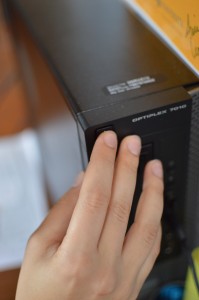Post contributed by Kyle Kimel, Office of Sustainability Intern
Energy-saving practices are an interesting topic of discussion. It seems the students I’ve talked with admit it can be very easy to save energy, but at the same time, they also admit they never really think about it in their daily lives. The lifestyle and mindset of “nothing I do will actually make a difference” needs to change.
Americans have done a better job of slowing down our energy consumption trend over the past five years. But think about the difference we could make if everyone did the “easy” things every day, like turning off the lights and adjusting the thermostat when you leave the house. Not only would we save energy, but we would also be saving LOTS of money. The typical household spends over two thousand dollars on utility bills annually, and could be cut by almost twenty-five percent with energy saving techniques. With over 100 million residences in the United States, that’s roughly 400 million dollars that’s being wasted on unnecessary energy consumption.

Powering down electronics only takes a second, but can help make a world of difference.
As college students, we can do our part by making the “easy” things part of our daily routine. When you leave for class every day and when you go to bed, make sure all the lights in your apartment or dorm are turned off. Another easy way for students to save energy is by turning off your gaming consoles when you’re not playing them. Even if they aren’t actually being used, gaming consoles use lots of energy just having them plugged in.
Although turning off the lights and adjusting your thermostat are great sustainable practices and an easy way to save money, we have to start taking the necessary steps as active citizens to impact our community on a larger scale. If you want to have a greater influence on the University and the surrounding community, you can register to vote in the City of Auburn and get actively involved in policy change that affects you personally.
How we get around also contributes to the energy that we consume. If you live on campus, try walking whenever you can, and only drive when it’s a necessity. If you live off campus, try walking, biking, or utilizing the transit system, whenever possible. Auburn University have made a great effort to provide a high-quality bus transit for its students, and a bike friendly campus; so let’s take advantage of it and save some energy and resources in the process.




